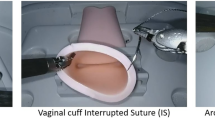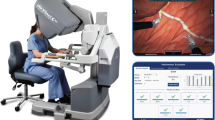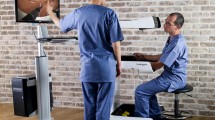Abstract
Purpose
The SimNow virtual reality platform was recently introduced but lacked validity evidence. Our team developed a novel robotic curriculum consisting of 19 SimNow drills and three inanimate drills with previously reported content and construct validity evidence and expert-derived proficiency levels. This study aimed to assess the feasibility and skill acquisition for novices.
Methods
Based on pre-test performance, second-year medical students (n = 20) were stratified and randomized (3:1 ratio). Group-1 underwent self-practice to proficiency on 19 SimNow and three inanimate drills (DaVinci-Xi System). Group-2 received no training. Both groups were pre- and post-tested using five representative SimNow drills and the three inanimate drills, as well as three inanimate transferability drills. Scores were based on time and errors.
Results
In Group-1, five individuals did not complete training. After 5 months, data were analyzed for Group-1 (n = 10, all participants reached proficiency on all drills) and Group-2 (n = 5). Total curriculum time (Group-1) was 12.1 [11.3–12.7] h with 149 [162–170] repetitions. There was no performance difference between groups at baseline (6.6 vs 7.4; p = 0.68). At post-test, Group-1 performed significantly better than Group-2 (81.7 vs 22.1; p < 0.01).
Conclusion
This study evaluated feasibility and quantified skill acquisition associated with our proficiency-based robotic curriculum. Novices were able to complete the curriculum in a reasonable amount of time and achieve expert-derived performance levels. We are optimistic about the utility of this curriculum for training residents and faculty.



Similar content being viewed by others
Data availability
The datasets generated during and/or analyzed during the current study are available from the corresponding author on reasonable request.
References
Satava RM, Stefanidis D, Levy JS, Smith R, Martin JR, Monfared S, Timsina LR, Darzi AW, Moglia A, Brand TC, Dorin RP, Dumon KR, Francone TD, Georgiou E, Goh AC, Marcet JE, Martino MA, Sudan R, Vale J, Gallagher AG. Proving the effectiveness of the fundamentals of robotic surgery (FRS) skills curriculum: a single-blinded, multispecialty, multi-institutional randomized control trial. Ann Surg. 2020;272(2):384–92. https://doi.org/10.1097/SLA.0000000000003220.
Chen R, Rodrigues Armijo P, Krause C, SAGES Robotic Task Force, Siu KC, Oleynikov D. A comprehensive review of robotic surgery curriculum and training for residents, fellows, and postgraduate surgical education. Surg Endosc. 2020;34(1):361–7. https://doi.org/10.1007/s00464-019-06775-1 (Epub 2019 Apr 5).
Schmiederer IS, Torices-Dardon A, Ferrari-Light DM, Charbel Abboud E, Villani V, Lau JN, Foglia CM. Developing a robotic general surgery training curriculum: identifying key elements through a Delphi process. J Surg Educ. 2021;78(6):e129–36. https://doi.org/10.1016/j.jsurg.2021.08.006 (Epub 2021 Aug 26).
Tom CM, Maciel JD, Korn A, Ozao-Choy JJ, Hari DM, Neville AL, de Virgilio C, Dauphine C. A survey of robotic surgery training curricula in general surgery residency programs: how close are we to a standardized curriculum? Am J Surg. 2019;217(2):256–60. https://doi.org/10.1016/j.amjsurg.2018.11.006 (Epub 2018 Nov 22).
Foell K, Furse A, Honey RJ, Pace KT, Lee JY. Multidisciplinary validation study of the da Vinci Skills Simulator: educational tool and assessment device. J Robot Surg. 2013;7(4):365–9. https://doi.org/10.1007/s11701-013-0403-6 (Epub 2013 Apr 21).
Lyons C, Goldfarb D, Jones SL, Badhiwala N, Miles B, Link R, Dunkin BJ. Which skills really matter? proving face, content, and construct validity for a commercial robotic simulator. Surg Endosc. 2013;27(6):2020–30. https://doi.org/10.1007/s00464-012-2704-7 (Epub 2013 Feb 7).
Alzahrani T, Haddad R, Alkhayal A, Delisle J, Drudi L, Gotlieb W, Fraser S, Bergman S, Bladou F, Andonian S, Anidjar M. Validation of the da Vinci surgical skill simulator across three surgical disciplines: a pilot study. Can Urol Assoc J. 2013;7(7–8):E520–9. https://doi.org/10.5489/cuaj.419.PMID:23914275;PMCID:PMC3713157.
Lendvay TS, Casale P, Sweet R, et al. VR robotic surgery: randomized blinded study of the dV-trainer robotic simulator. Stud Health Technol Inform. 2008;132:242–4.
Kenney PA, Wszolek MF, Gould JJ, et al. Face, content, and construct validity of dV-trainer, a novel virtual reality simulator for robotic surgery. Urology. 2009;73:1288–92. https://doi.org/10.1016/j.urology.2008.12.044.
Sethi AS, Peine WJ, Mohammadi Y, et al. Validation of a novel virtual reality robotic simulator. J Endourol. 2009;23:503–8. https://doi.org/10.1089/end.2008.0250.
Radi I, Tellez JC, Alterio RE, Scott DJ, Sankaranarayanan G, Nagaraj MB, Hogg ME, Zeh HJ, Polanco PM. Feasibility, effectiveness and transferability of a novel mastery-based virtual reality robotic training platform for general surgery residents. Surg Endosc. 2022;22:1–9. https://doi.org/10.1007/s00464-022-09106-z (Epub ahead of print).
Alterio RE, Nagaraj MB, Scott DJ, Tellez J, Radi I, Baker HB, Zeh HJ Polanco PM. Developing a robotic curriculum: content validity analysis of the da Vinci® Xi Sim-Now platform. In: Academic surgical congress (ASC) annual meeting, Orlando, FL. Oral presentation, Feb 1–3, 2022.
Tellez JC, Radi I, Alterio RE, Baker HB, Nagaraj MB, Scott DJ, Zeh HJ, Polanco PM. Developing a robotic surgery curriculum: construct validity analysis of a novel virtual reality training platform. In: Society of American gastrointestinal and endoscopic surgeons (SAGES) annual meeting, Denver, CO. ePoster Presentation, March 16–19, 2022.
Dulan G, Rege RV, Hogg DC, Gilberg-Fisher KM, Arain NA, Tesfay ST, Scott DJ. Developing a comprehensive, proficiency-based training program for robotic surgery. Surgery. 2012;152(3):477–88. https://doi.org/10.1016/j.surg.2012.07.028.
Arain NA, Dulan G, Hogg DC, Rege RV, Powers CE, Tesfay ST, Hynan LS, Scott DJ. Comprehensive proficiency-based inanimate training for robotic surgery: reliability, feasibility, and educational benefit. Surg Endosc. 2012;26(10):2740–5. https://doi.org/10.1007/s00464-012-2264-x (Epub 2012 Apr 27).
Hogg ME, Tam V, Zenati M, Novak S, Miller J, Zureikat AH, Zeh III HJ. Mastery-based virtual reality robotic simulation curriculum: the first step toward operative robotic proficiency. J Surg Educ. 2017;74:477–85. https://doi.org/10.1016/j.jsurg.2016.10.015.
Scott DJ. Proficiency-based training for surgical skills. Sem Colon Rectal Surg. 2008;19(2):72–80. https://doi.org/10.1053/j.scrs.2008.02.003.
Seymour NE, Gallagher AG, Roman SA, O’Brien MK, Bansal VK, Andersen DK, Satava RM. Virtual reality training improves operating room performance: results of a randomized, double-blinded study. Ann Surg. 2002;236(4):458–63. https://doi.org/10.1097/00000658-200210000-00008 (discussion 463–464).
Scott DJ, Ritter EM, Tesfay ST, Pimentel EA, Nagji A, Fried GM. Certification pass rate of 100% for fundamentals of laparoscopic surgery skills after proficiency-based training. Surg Endosc. 2008;22(8):1887–93. https://doi.org/10.1007/s00464-008-9745-y (Epub 2008 Feb 13).
Ritter EM, Scott DJ. Design of a proficiency-based skills training curriculum for the fundamentals of laparoscopic surgery. Surg Innov. 2007;14(2):107–12. https://doi.org/10.1177/155335060730232.
Acknowledgements
The authors gratefully acknowledge support provided by the UT Southwestern Simulation Center. We would also like to thank the medical students who volunteered their time to participate in this study.
Funding
No funding received.
Author information
Authors and Affiliations
Corresponding author
Ethics declarations
Conflict of interest
We have no financial conflicts of interest to disclose.
Supplementary Information
Below is the link to the electronic supplementary material.
Rights and permissions
Springer Nature or its licensor (e.g. a society or other partner) holds exclusive rights to this article under a publishing agreement with the author(s) or other rightsholder(s); author self-archiving of the accepted manuscript version of this article is solely governed by the terms of such publishing agreement and applicable law.
About this article
Cite this article
Nagaraj, M.B., Baker, H.B., Polanco, P.M. et al. Feasibility and skill acquisition for a novel proficiency-based robotic surgery curriculum: a randomized medical student pilot. Global Surg Educ 1, 67 (2022). https://doi.org/10.1007/s44186-022-00061-w
Received:
Revised:
Accepted:
Published:
DOI: https://doi.org/10.1007/s44186-022-00061-w




